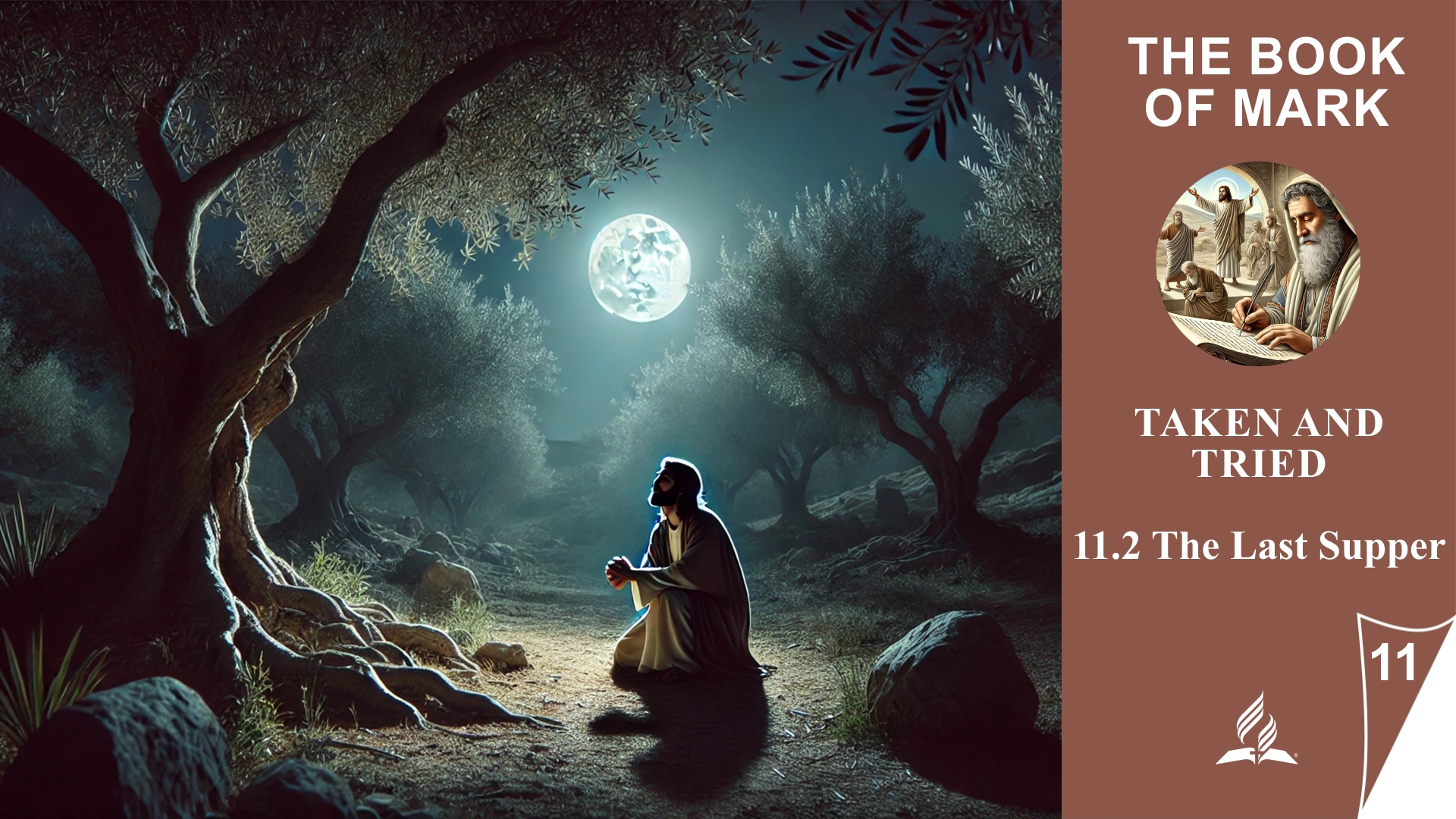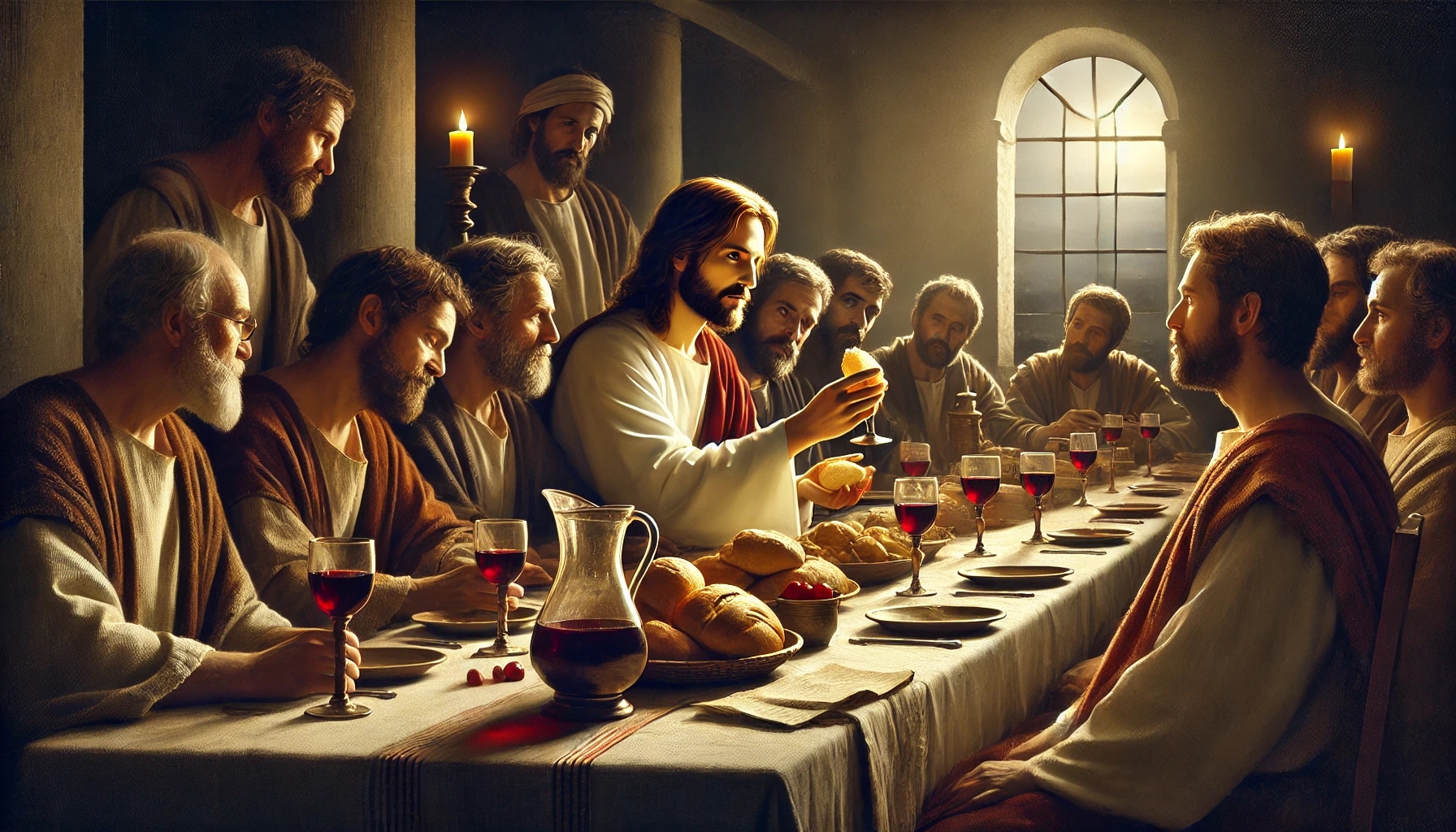


11.2 The Last Supper
The New Covenant: Jesus’ Sacrifice and the Promise of Salvation
Read Mark 14:22-31 and Exodus 24:8. What major significance for the Christian faith is found in this account?
The passage from Mark 14:22–31 and Exodus 24:8 reveals central aspects of the Christian faith and has profound significance for understanding the Lord’s Supper.
The Last Supper takes place on the first day of Unleavened Bread, at the time when the Passover lamb is sacrificed. This is more than just a traditional meal; it marks the introduction of a new memorial service by Jesus. On this evening, a transition occurs from the Jewish Passover to the institution of the New Covenant. The New Covenant is not sealed with the blood of a Passover lamb but with the blood of Jesus Himself. This directly relates to the sealing of the Old Covenant in Exodus 24:8, where Moses sprinkles the people with the blood of sacrifices and declares: “This is the blood of the covenant that the LORD has made with you.”
Jesus uses this evening to convey a profound meaning: He Himself is the “Lamb of God” (cf. John 1:29), whose blood seals the New Covenant. The bread He breaks symbolizes His body, and the cup represents His blood, shed for many (Mark 14:24). This signifies a fundamental change in the relationship between God and humanity. The New Covenant fulfills the promises of the Old Testament and is established through Jesus’ sacrifice.
Amidst this solemn moment, Jesus announces that all His disciples will abandon Him. He quotes Zechariah 13:7, which speaks of the striking of the shepherd and the scattering of the sheep. This grim prediction reflects human weakness and the failure that Jesus will experience. Despite this dark prophecy, Jesus adds a message of hope: the prediction of His resurrection and the promise that He will meet His disciples in Galilee. This underscores the importance of the resurrection as a sign of new life and hope.
The prediction that Peter will deny Him three times before the rooster crows twice is another central point. This announcement highlights human frailty and the challenge of faith in times of trial. It plays a key role in the Passion narrative and Peter’s denial, showing the depth of divine providence and human weakness.
Overall, the Last Supper reveals a fundamental transformation in the relationship between God and humanity through Jesus’ sacrifice. It stands at the heart of Christian faith by replacing the old sacrifices and establishing the New Covenant through the blood of Christ. At the same time, it is a moment of reverence and hope, reminding us of the profound significance of Jesus’ death and resurrection.
Have you ever promised God to do or not do something, and then failed to keep that promise? What can you learn from this?
Yes, this is an experience many believers have had when they promise God something but fail to keep it. In moments of devotion or repentance, there is often a strong desire to change or commit to God, but over time, it becomes difficult to remain faithful to these resolutions.
From such situations, we can learn valuable lessons:
-
Human Weakness: These experiences show us how limited our human strength is. Even the best intentions can fail due to temptations, fatigue, or neglect. It reminds us that we are dependent on God’s grace and strength in all things to do what is right.
-
Humility: Failing to keep promises teaches us humility. It shows that we are flawed people who need forgiveness and patience—both from God and from ourselves.
-
Grace and Forgiveness: Such moments emphasize the importance of God’s grace. Even when we fail, God forgives us if we sincerely repent. This helps us not to give up but to keep trying, trusting in God’s support.
-
Dependence on God: When we fail, we learn that we cannot rely on our own strength alone. We must ask God for guidance and support to grow in our spiritual life.
-
Patience with Ourselves: Repeating mistakes can be frustrating, but it also gives us the opportunity to practice patience with ourselves and recognize the constant need for growth and maturity.
Through these experiences, we learn that our faith and relationship with God is a journey, not a one-time success. It’s about returning again and again, continuing to learn, and allowing ourselves to be shaped by God’s hands.
The connection between the Last Supper and our daily lives and faith lies in the deep symbolism of Jesus’ sacrifice and the introduction of the New Covenant, calling us to self-reflection and a realignment in our faith.
-
The New Covenant and Our Daily Relationship with God: The Last Supper marks the beginning of a new covenant centered on Jesus’ sacrifice. In everyday life, this reminds us that our relationship with God is not based on our own achievements but on His grace and the sacrifice of Christ. It calls us to live our lives in gratitude and dedication, knowing that our salvation is secured through Jesus.
-
Human Weakness and the Failure of the Disciples: In Mark 14:22–31, we see how Jesus predicts that His disciples will abandon Him. This reflects our own human weakness when, despite our best intentions, we often fail to obey God or keep our promises. In daily life, this understanding can help us be patient with ourselves and trust in God’s grace instead of condemning ourselves for our mistakes.
-
Hope Through Jesus’ Resurrection: Despite the grim prediction that His disciples will abandon Him, Jesus gives them the hope of His resurrection. For us in daily life, this means that even in moments of failure, despair, or suffering, the hope of renewal and forgiveness through Jesus is always present. The resurrection reminds us that God always offers us the chance to begin anew.
-
The Significance of the Lord’s Supper in the Life of Faith: The Lord’s Supper is not just a reminder of Jesus’ sacrifice, but also a constant invitation to renew our connection with Him. When we take the bread and cup, we affirm our trust in the New Covenant and our dependence on God’s grace. This regular practice can help us focus on the essentials of faith: love, dedication, and communion with God.
-
Forgiveness and Restoration: The prediction of Peter’s denial shows that even those closest to Jesus can fail. Yet, after his failure, Peter experiences forgiveness and later becomes a significant leader in the early church. This teaches us that we, too, can be restored after failure and that God can do great things through us when we return to Him.
In summary, the Last Supper connects our daily spiritual journey with the constant reminder of God’s grace, forgiveness, and the hope we have through Jesus Christ. Our faith life, like that of the disciples, is a journey full of highs and lows, but it is always supported by the promise of redemption and the love of God.

Every day is a new opportunity to experience God’s grace and grow in His love.
Visited 67 times, 1 visit(s) today







